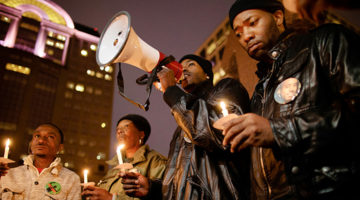Review: Concerning Violence
The vicious historical scars of European colonization in Africa couldn’t possibly be contained by a single volume book or an 80 minute film, but Swedish filmmaker Göran Olsson’s Concerning Violence (opening at The Bloor Hot Docs Cinema this Friday following a debut at last year’s Hot Docs festival) takes a unique and literate approach. Taking his cues entirely from Frantz Fanton’s 1961 text The Wretched of the Earth and setting them to various viewpoints through archival footage, Olsson has crafted an anthropological pastiche that’s just as vital now as Fanton’s work was over fifty years ago.
Following a lengthy six minute sit-down interview prologue that instructs the viewer on how to read the film and talks about Fanton’s work and history, Olsson (The Black Power Mixtape: 1967-1975) divides his film into a series of chapters about colonization, oppression, and gradually about the potential for revolution. While Olsson, Fanton, and narrator Lauren Hill all speak about how violence can act as a final cleansing force. It’s understood that they first have to look at how through Christianity, capitalism, and generalized European arrogance a country and an entire race can become marginalized, enslaved, and forced into uneasy complacency by settlers trying to redefine an already existing land in their own image.
It’s the job of Fanton and Hill to lay bare the psychological, historical, and cultural ramifications of colonization and decolonization, but it’s the job of Olsson to adapt such an academic and erudite text to a visual medium. He does so quite brilliantly by bouncing back and forth through time and from different viewpoints in different colonized nations and communities. It’s footage that most (white) people would never think to look at again, but Olsson has proven himself an adept historically minded filmmaker with an ear for the past and an eye for the present.
Olsson places the viewer back during a 1966 worker strike in Liberia at a Swedish-American mining concern where non-violent unions are busted and dissenting workers are evicted and forced to live on the very outskirts of their own society. There’s time spent in the jungles of Mozambique where weary guerillas hold out hope for ending over 500 years of oppression and institutionalized racism. A sit down with a freedom fighter in Burkina Faso circa 1987 outlines clearly the demarcation between self-sufficiency and the desire to ask for external aid. There are also a pair of cringe inducing interviews from the perspectives of white people as a loathsome man from Rhodesia wistfully drones on about being forced to leave “his home” and a pair of Christian missionaries are put on the spot by a surprisingly progressive interviewer (for the time) for prioritizing the building of a mega-church over construction of schools, hospitals, and housing.
It’s episodic by design, but all the more interesting for it. The associations drawn between the core text and the footage being used forces viewers to draw thoughtful conclusions about how decolonization can quite often only be carried about by people that have been broken down so much that they can only dream about being strong enough to rise up against their oppressors. It illustrates revolution as causality: oppression that leads to threats of torture and poverty can only eventually come back around on itself when the oppressors have no desire to engage in a peaceful discourse regarding their withdrawal or co-habitation. There’s a lot more that can be said about the subject, but on the subject of European expansion and how its effects have becomes sadly everlasting, there are few better introductory primers.
[star v=4]





